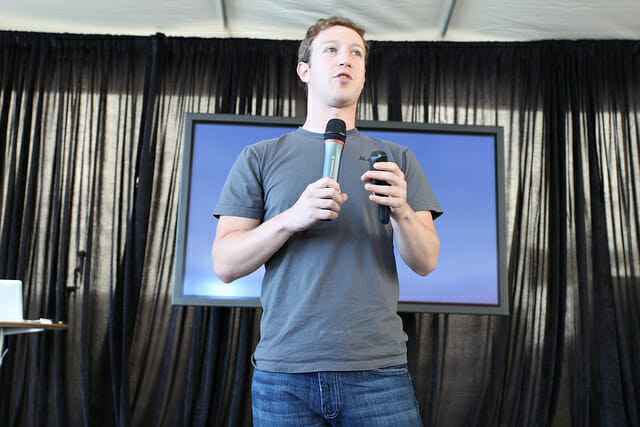After Texas School Massacre, Facebook Trolls Spread Disinformation
Already under fire for fake content, the social media company’s response after Friday’s tragedy shows it is still not prepared to deal with the problem. Mark Zuckerberg, chairman and chief executive officer of Facebook. (Wikimedia Commons)
Mark Zuckerberg, chairman and chief executive officer of Facebook. (Wikimedia Commons)
It’s a horrifyingly common pattern. First, the tragic event, such as America’s latest school shooting, in Galveston County, Texas, on Friday. Then, the grief over the loss of lives is compounded by online hoaxes and disinformation—especially on Facebook.
In the aftermath of the shooting at Santa Fe High School that left 10 people dead, the online trolls wasted no time in creating their first hoax. Among other things, they created fake photos of the suspect, Dimitrios Pagourtzis, wearing a hat saying “Hillary 2016.”
This and similar postings were quickly flagged and removed by the social network, but as The Washington Post notes, “others rose rapidly in their place.” Also:
Chris Sampson, a disinformation analyst for a counterterrorism think tank, said he could see new fakes as they were being created and filled out with false information, including images linking the suspect to the anti-fascist group Antifa.
What Sampson and others found particularly jarring about the fake responses to the Santa Fe High shooting, however, was how quickly these posts not only spread but became viral weapons in a widespread disinformation war. Sampson, according to the Post’s article, “said he watched the clock after the suspect was first named by police to see how long it would take for a fake Facebook account to be created in the suspect’s name: less than 20 minutes.”
Many of the fake accounts were under Pagourtzis’ name. It’s not clear who created them, but that they were created and spread so easily is a sobering reminder of just how ill-prepared Facebook is to deal with an influx of fake posts and profiles.
The company was already under fire for how its posts and ads may have impacted the outcome of the 2016 presidential election.
Facebook has released 3,000 ads by the Kremlin-backed group Internet Research Agency. These ads didn’t provide the smoking gun many “Russiagate” believers had been hoping for, but they did reveal just how easy it is for anyone, foreign actor or not, to create false information on Facebook that can quickly go viral.
“What I’d say surprises me is the low threshold for ad buys,” Nina Jankowicz, global fellow at the Woodrow Wilson Center’s Kennan Institute, who studies disinformation, told Truthdig. “We’re talking pennies and dollars for most of them,” she continued, with “a few notable exceptions in the $100 range, and even fewer above $1,000.” In some cases, users didn’t even have to pay for ads but could simply create organic-seeming posts with blatantly false information.
Facebook, in response to both the Internet Research Agency ads and the posts after the Santa Fe High shooting, has said that it has 10,000 human moderators watching the site and intends to double that number by the end of the year.
Still, all social networks have a long way to go toward preventing something like this from happening again, as the Post story points out: “Some critics suggested the site should force new accounts into a waiting period before they are publicly available or that the company should more aggressively watch names in the news for potential fakes.”
Your support matters…Independent journalism is under threat and overshadowed by heavily funded mainstream media.
You can help level the playing field. Become a member.
Your tax-deductible contribution keeps us digging beneath the headlines to give you thought-provoking, investigative reporting and analysis that unearths what's really happening- without compromise.
Give today to support our courageous, independent journalists.






You need to be a supporter to comment.
There are currently no responses to this article.
Be the first to respond.